- GILD is down 16.6% from 12-month high close
- Company reported strong Q1 results at the end of April
- Earnings growth outlook weak
- Wall Street analyst consensus rating is bullish
- The market-implied outlook is bullish
- Looking for more top-rated stock ideas to add to your portfolio? Members of InvestingPro+ get exclusive access to our research tools, data, and pre-selected screeners. Learn More »
- Inflation
- Geopolitical turmoil
- Disruptive technologies
- Interest rate hikes
Since hitting a 12-month high closing price of $73.64 on Dec. 29, pharmaceutical drug manufacturer Gilead Sciences (NASDAQ:GILD) has fallen 18.6%, for a total return (including dividends) of -16.6%. The decline accelerated after Feb. 2, when the company reported Q4 earnings that were less than half the consensus expected value. GILD has trailing 3- and 5-year total annualized returns of -0.14% and 2.17%, respectively.
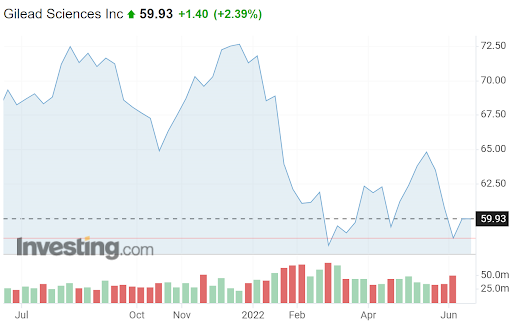
Source: Investing.com
It was understood that sales of Veklury (aka remdesivir), a drug widely used to treat hospitalized COVID patients, was likely to decline but the speed and magnitude of the reduced sales were something of a shock. Veklury revenue for Q4 of 2021 was down 30% year-on-year. Even with 8% revenue growth across all other product lines, the drop in Veklury sales was sufficient to drive GILD’s YoY sales down 2%.

Source: E-Trade
Green (red) values are amounts by which EPS beat (missed) the consensus expected value.
Q1 2022 earnings, reported on April 28, beat expectations by 17.3%. Total sales were up 3% YoY. Veklury sales were up YoY, largely due to use of the drug outside of the U.S. The company also announced a substantial number of new drug trials planned for 2022 and 2023.
GILD has a dividend yield of 4.99%, with trailing 3- and 5-year annualized dividend growth rates of 6.3% and 7.8% per year, respectively. The consensus expected value for annualized EPS growth is -0.32% per year over the next three to five years, but the low payout ratio of 39% means that the company has the capacity to continue to grow the dividend.
I last wrote about GILD on December 15, 2021, at which time the shares were trading at $70.45, and I maintained a neutral/hold rating. The main concerns at that time were similar to those today. The earnings growth outlook was weak and it was hard to predict the drop-off in demand for Veklury. The Wall Street analyst consensus at that time was bullish, with a consensus 12-month price target that implied a total return of 13.2% over the next year. The consensus outlook implied by options prices, the market-implied outlook, was neutral to mid-June of 2022 but slightly bearish for the full year. Considering the earnings outlook, the bullish Wall Street consensus and the neutral/slightly bearish market-implied outlook, I assigned a neutral overall rating for GILD.
Since Dec. 15, GILD has returned a total of -13.7%, compared with -19.2% for the S&P 500 (NYSE:SPY), including dividends.
For readers who are unfamiliar with the market-implied outlook, a brief explanation is needed. The price of an option on a stock is largely determined by the market’s consensus estimate of the probability that the stock price will rise above (call option) or fall below (put option) a specific level (the option strike price) between now and when the option expires. By analyzing the prices of call and put options at a range of strike prices, all with the same expiration date, it is possible to calculate a probabilistic price forecast that reconciles the options prices. This is the market-implied outlook. For a deeper explanation and background, I recommend this monograph published by the CFA Institute.
With about six months since my last analysis, I have calculated the market-implied outlook for GILD through the end of 2022 and to the middle of 2023. I have compared these with the current Wall Street consensus outlook in revisiting my rating on GILD.
Wall Street Consensus Outlook For GILD
E-Trade calculates the Wall Street consensus outlook by aggregating ratings and price targets from 12 ranked analysts who have published their views over the past three months. The consensus rating is bullish, as it has been for all of the past year. The consensus 12-month price target is 17.05% above the current share price.
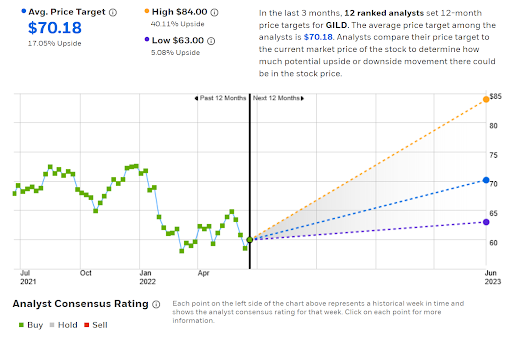
Source: E-Trade
Investing.com’s version of the Wall Street consensus outlook is calculated using ratings and price targets from 28 analysts. The consensus rating is bullish and the consensus price target is 15.6% above the current price.
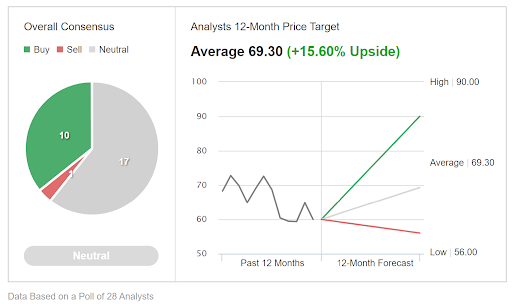
Source: Investing.com
Averaging these two consensus price targets and adding the dividend, the expected total return over the next 12 months is 21.3%. Given the anemic expected growth, the consensus outlook suggests that the market is undervaluing current earnings.
Market-Implied Outlook For GILD
I have calculated the market-implied outlook for the 7-month period from now until Jan. 20, 2023, and for the 11.8-month period from now until June 16, 2023, using the prices of options that expire on each of these two dates. I chose these specific expiration dates to provide a view through the end of 2022 and to provide a (roughly) 12-month outlook. The options trading volume and open interest on the options expiring in January are considerably higher than for the options expiring in June of 2023. For this reason, the 7-month outlook carries more weight in my assessment.
The standard presentation of the market-implied outlook is a probability distribution of price return, with probability on the vertical axis and return on the horizontal.
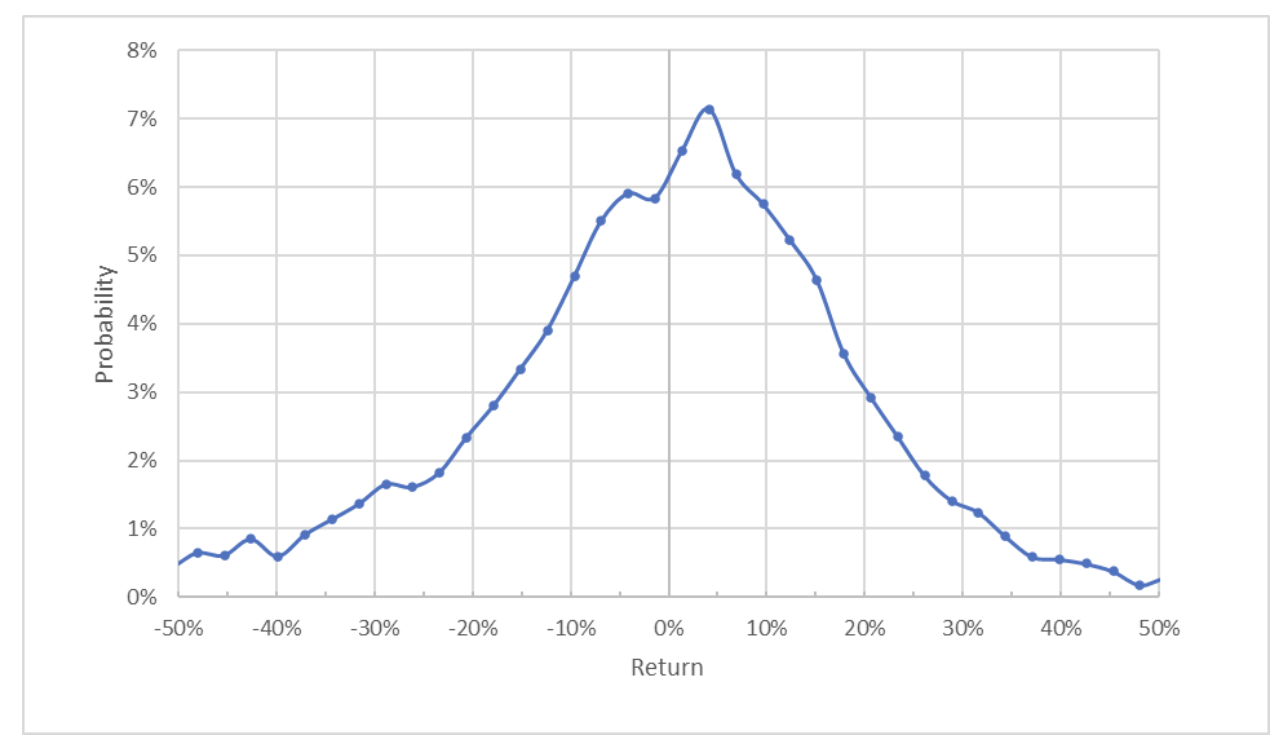
Source: Author’s calculations using options quotes from E-Trade
The market-implied outlook to Jan. 20 is generally symmetric, with comparable probabilities of positive and negative returns of the same magnitude, but the peak in probability is tilted to favor positive returns. The maximum probability corresponds to a price return of 4%. The expected volatility calculated from this distribution is 27% (annualized).
To make it easier to directly compare the relative probabilities of positive and negative returns, I rotate the negative return side of the distribution about the vertical axis (see chart below).
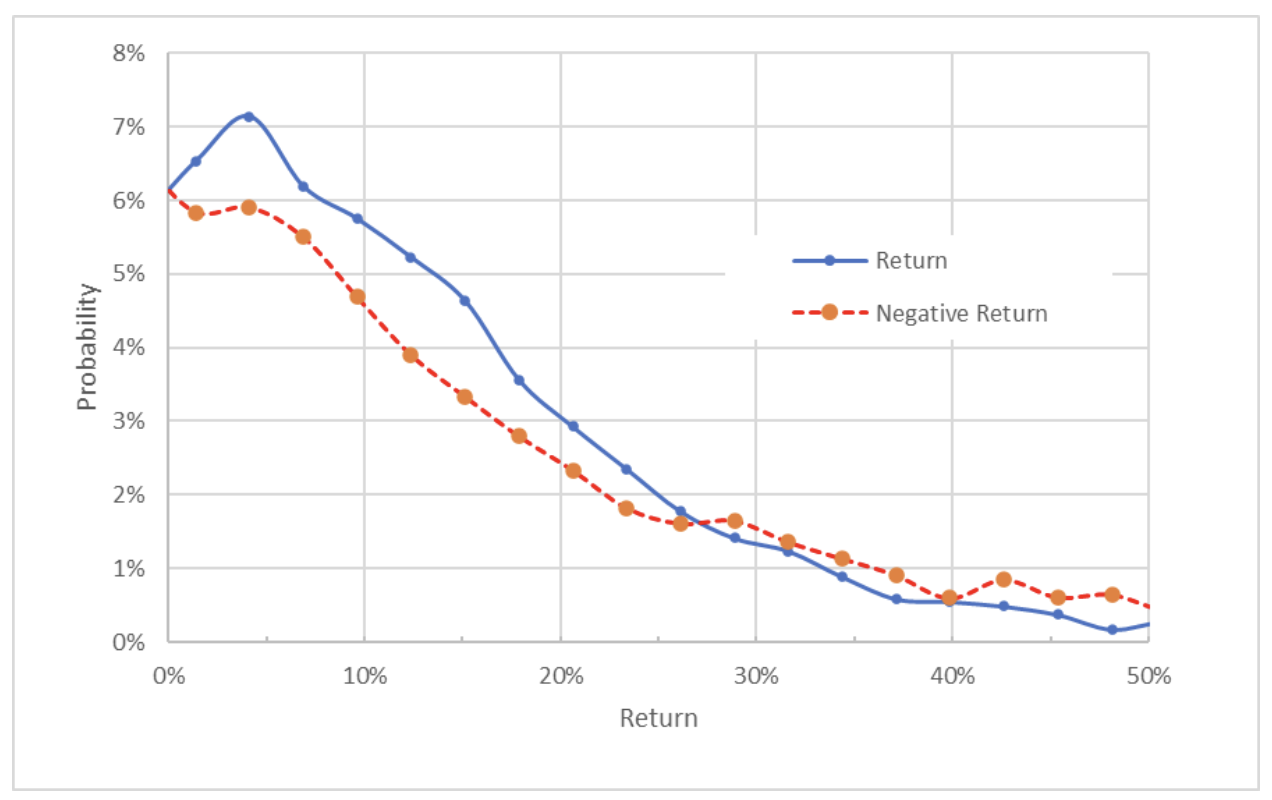
Source: Author’s calculations using options quotes from E-Trade
The negative side of the distribution has been rotated about the vertical axis
This view shows the degree to which the probabilities of positive returns are consistently higher than the probabilities of same-magnitude negative returns, across a wide range of the most probable outcomes (the solid blue line is consistently above the dashed red line over the left half of the chart above). This is a bullish outlook for GILD for the next seven months.
Theory indicates that the market-implied outlook is expected to have a negative bias because investors, in aggregate, are risk averse and, thus, tend to pay more than fair value for downside protection. There is no way to measure the magnitude of this bias, or whether it is even present, however. The expectation for a negative bias strengthens the bullish interpretation of this outlook.
The market-implied outlook for the next 11.8 months exhibits closely matching probabilities for positive and negative returns. Because of the expectation that the market-implied outlook will be negatively biased, this market-implied outlook is interpreted as slightly bullish. The expected volatility calculated from the 11.8-month outlook is 28% (annualized).
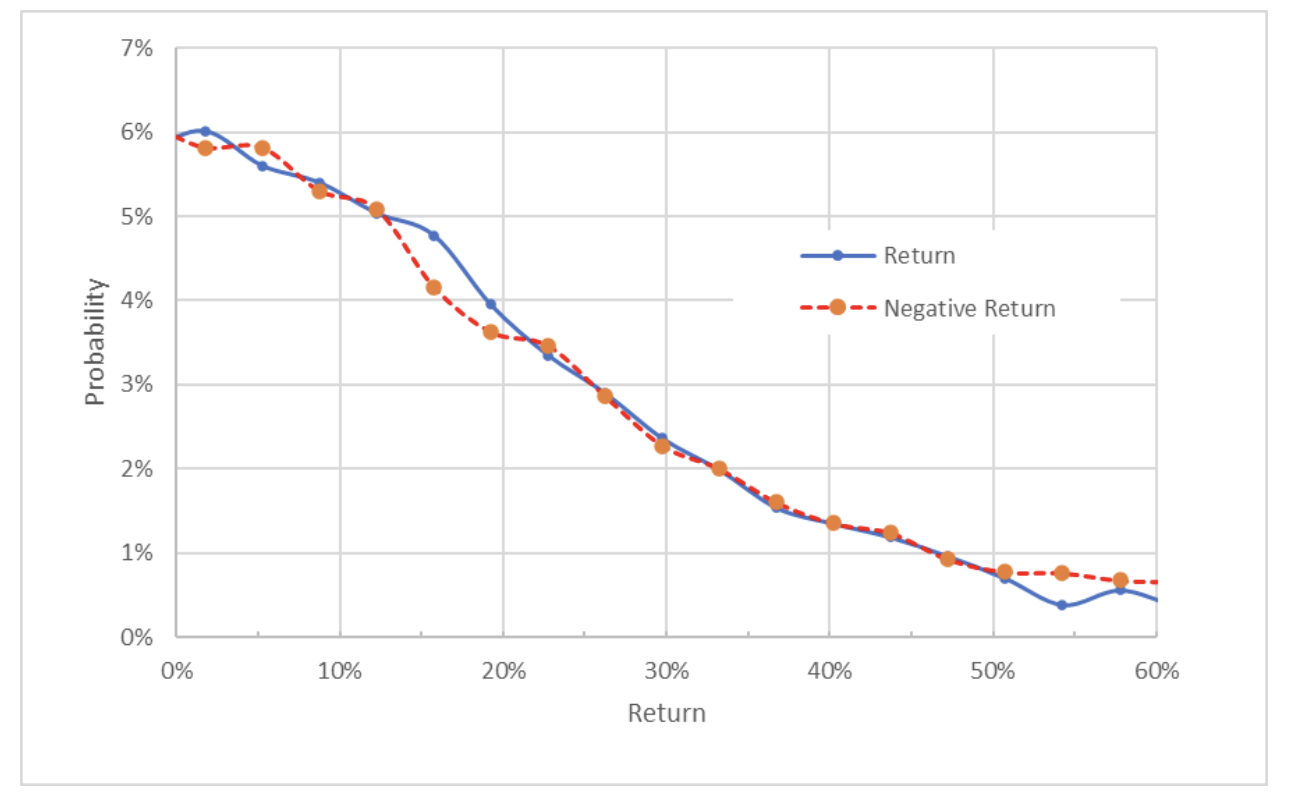
Source: Author’s calculations using options quotes from E-Trade
The negative side of the distribution has been rotated about the vertical axis
The market-implied outlook is bullish to early 2023 and slightly bullish for the 11.8-month period from now until June 16, 2023. This is a considerable improvement compared to the market-implied outlooks at the end of 2021. The expected volatility is stable at 27%-28%.
Summary
Even with low expectations for earnings growth in the coming years, the Wall Street consensus rating for GILD continues to be bullish, indicating that the shares have been oversold in the current market decline. The Wall Street consensus 12-month price target implies a 21% total return over the next year. As a rule of thumb for an attractive risk-return trade-off, I want to see an expected 12-month return that is at least half the expected annualized volatility (27%-28%). GILD easily surpasses this threshold. The market-implied outlook for GILD is bullish, albeit only mildly for 2023 in its entirety. I am changing my rating on GILD from neutral/hold to bullish/buy.
***
The current market makes it harder than ever to make the right decisions. Think about the challenges:
To handle them, you need good data, effective tools to sort through the data, and insights into what it all means. You need to take emotion out of investing and focus on the fundamentals.
For that, there’s InvestingPro+, with all the professional data and tools you need to make better investing decisions. Learn More »
